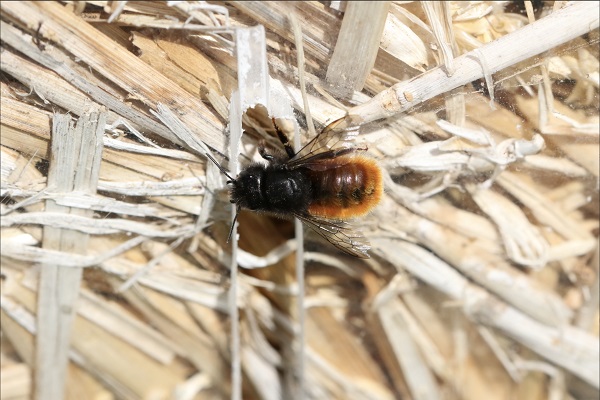 Credit: © Claude Kolwelter
Credit: © Claude Kolwelter
In the latest in a series of articles about current conservation issues, experts at natur&ëmwelt, a leading nature conservation NGO in Luxembourg, spoke to Chronicle.lu about the vital roles that insects play in our ecosystems.
Natur&ëmwelt volunteer Claire Schroeder helped collect the relevant information from the NGO for this article.
As the NGO explained, insects are not just background buzz; insects are tiny titans - pollinators, recyclers, engineers and food sources all in one. Their survival is tied to our own. Protecting them means protecting biodiversity, food security and the health of our planet. Every small action helps.
Chronicle.lu: We often overlook insects, but just how important are they to Luxembourg’s ecosystems?
Natur&ëmwelt: Insects are absolutely essential. Luxembourg may be small, but its mix of forests, meadows, rivers and farmland supports an incredible diversity of insect life. From the colourful peacock and red admiral butterflies to the lesser-known ground beetles and solitary bees, these tiny creatures are quietly doing a lot of heavy lifting. They pollinate wildflowers and crops, control pests, and enrich the soil by breaking down dead plant and animal matter.
Chronicle.lu: That sounds impressive! But are insects not just food for other animals?
Natur&ëmwelt: Yes, that’s a huge part of their value. Insects form the base of the food chain, providing vital nutrition for birds, amphibians, reptiles and even mammals. But beyond being food, many are also ecosystem engineers. Beetles, ants and flies help recycle nutrients, improving soil health, which in turn supports future plant life. However, that’s not all: insects play the crucial role of pollinators. Bees - both honeybees and solitary species like the wool carder or hairy-footed flower bee - are the most well-known pollinators, but butterflies, wasps, beetles and even hoverflies also do their part. Without them, many plants couldn’t reproduce. But pesticides and herbicides are making survival harder for both the insects and the plants they rely on.
Chronicle.lu: Does that mean that insect populations are in trouble here in Luxembourg?
Natur&ëmwelt: Unfortunately, yes. Intensive agriculture, chemical use and habitat fragmentation have led to sharp declines. Some species once common in the 1950s and '70s are now rare or even extinct. Add climate change to the mix and we’re seeing southern species like praying mantises moving north, while invasive species like the Asian hornet threaten native bees. It’s a cascade effect that puts the whole ecosystem at risk.
Chronicle.lu: What can people in Luxembourg do to support insect life?
Natur&ëmwelt: Whether you have a garden, a balcony or just a few potted plants, you can help. Let wildflowers grow, leave seed heads be and assemble leaf piles to act as habitat, or even add a shallow bowl of water with twigs to allow pollinators to rehydrate in the warmer months. Skip the pesticides and go for native plant species rich in nectar and pollen. “Messy” corners of a garden can become vital habitat! If you do not have an outdoor space of your own, do your best to support your local farmers using chemical-free processes as well as your local beekeepers.
Chronicle.lu: How can we coexist with insects we might not love, such as wasps or mosquitoes?
Natur&ëmwelt: Respectful coexistence is key. Wasps and bees aren’t aggressive unless threatened, avoid sudden movements and don’t block their nests. Outdoors, keep food, drinks (especially in opaque bottles and cans) covered, and children’s hands and faces clean, and steer clear of strong fragrances, which can attract or irritate them. For mosquitoes, eliminate stagnant water and use natural repellents like citronella. Encouraging birds with nest boxes and hedges also helps keep pests under control naturally.
Chronicle.lu: Speaking about pest control - you mentioned insects help there too?
Natur&ëmwelt: Absolutely. Ladybugs, lacewings, praying mantises and parasitic wasps naturally keep pests like aphids and caterpillars in check. It’s pest control without the chemicals! Some even spread natural pathogens to harmful species, making ecosystems more balanced and resilient.
Chronicle.lu: Are there local efforts in which the public can get involved?
Natur&ëmwelt: Yes! You can take part in the Insect Census by natur&ëmwelt this June (14-22). Just one hour of counting insects in your area helps researchers monitor local populations. You can also visit places like Maison de la Nature or Biodiversum to learn more. Volunteering with natur&ëmwelt at one of the many "chantiers nature", held annually between October and March or the LIST’s citizen science projects is another great way to make a difference.








